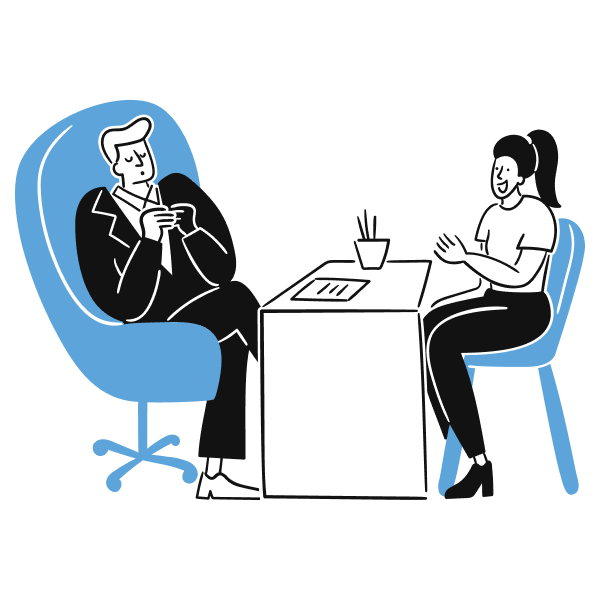Cognitive behavioral therapy (CBT) is a treatment method in psychology. It is commonly used for anxiety disorders, trauma and depression. Learn more about CBT, how it works and when it is an appropriate form of treatment.
What is cognitive behavioral therapy?
Cognitive Behavioral Therapy is a form of psychotherapy that focuses on changing non-working thought patterns and behaviors that contribute to mental health problems such as anxiety and depression.
CBT focuses on identifying and challenging negative thoughts and beliefs. You learn skills to redirect non-helpful thoughts or behaviors into realistic thoughts and positive behaviors. CBT is a scientifically based and effective form of psychotherapy used to treat various mental disorders.
Cognitive behavioral therapy focuses on your thoughts, feelings and behaviors in relation to your symptoms. In therapy, we ask questions such as:
- Do your thought patterns match reality?
- Are you imagining things in your head that are actually not quite true, or helpful?
- What are your beliefs about certain events?
- And are they justified?
Cohesion between thoughts, feelings, behavior & symptoms
Your thoughts affect your feelings. And thoughts pop up in your head all day long. Whether they are conscious or unconscious thoughts, they strongly influence your feelings. For example, your feelings are influenced by your own opinions about certain topics, or by memories from your childhood. But your self-image also plays a role.
An example
You are about to apply for a job and find it extremely exciting. Negative thoughts pop into your head:
“I probably don’t have enough experience and they probably won’t like me.”
These are examples of mostly unhelpful thoughts that are coming from reduced self-confidence. The question then becomes: are these thoughts actually true? And why do you think this way about yourself?
Avoidant behaviors also result in negative feelings. For example, if you have agoraphobia, going to the supermarket can be quite a challenge for you. When you give in to that fear and start avoiding crowded places, you don’t get over your anxiety.
How does cognitive behavioral therapy work?
In CBT you learn to look at a situation in a more objective way. In this way, your thoughts have less influence on how you feel. These more positive feelings influence your behavior. This way your behavior patterns will change as well.
It also works the other way around. Your feelings can also change as a result of your behavior.
An example:
When you are afraid of dogs, a behavioral experiment can work. You start petting dogs, despite your fear. As you notice this going well, your fear becomes less believable and you eventually become less anxious.
Is CBT right for me?
Cognitive behavioral therapy is used for many different mental health difficulties. It has been proven that this therapy can help well with such things as:
- Depression;
- Anxiety;
- Panic;
- Trauma and PTSD;
- Sleeping problems;
- Eating disorders;
- Addiction problems.
What does a CBT treatment look like?
1. Intake
Before the treatment begins, the psychologist will ask you a few questions. He or she will discuss your needs with you. And where you would like to go.
- Which factors maintain the problem?
- What is your goal of treatment and when is treatment successful for you?
2. Treatment plan
The psychologist will talk with you about your unhelpful thoughts that are bothering you, and you will review together what current behaviors are continuing the problems. You discuss which of these thoughts or (avoidance) behaviors you would like to change. After this the psychologist creates a specific treatment with you.
3. Treatment
The therapy consists of 3 parts.
1. Psycho-education
The psychologist first explains to you how the psyche works. To achieve results with CBT, you must first make sure you learn to understand the problem;
2. Learning new skills
You will work on learning new skills, including:
- Self-observation. By observing your own thoughts, feelings and behaviors, you gain insight into patterns that contribute to the difficulties.
- Identifying negative thinking patterns. By recognizing thinking errors, such as overgeneralization and black-and-white thinking, you learn to develop more realistic thoughts.
- Restructuring thinking patterns. You learn to challenge negative thinking patterns and replace them with more realistic and positive alternatives. This improves your mood and behavior.
- Exposure. In Exposure Therapy, you are incrementally exposed to situations that make you anxious. This helps you learn to cope with anxiety and avoidance.
- Behavioral Activation. You learn to plan and perform activities that you enjoy and give you energy. This is how you get yourself out of a downward spiral of inactivity and negative thoughts.
- Communication Skills. You learn how to communicate effectively with others. This helps reduce conflict and improve your relationships.
In these 6 phases, you learn that your current thoughts and behaviors of the reason why you are seeing the psychologist (e.g. anxiety disorder, depressive mood disorder, or PTSD) are not helping. And you learn how to deal with them.
Not only do you work on this during the session with the psychologist. But you also get homework. It is important that you actively contribute to your recovery.
3. Prevention plan
In the end the psychologist also draws up a prevention plan with you. This prevents you from falling back into old, unhelpful thoughts or behavioral patterns and having new symptoms.
Psychologist Cognitive Behavioral Therapy
During an introduction consultation a psychologist can look together with you to see if cognitive behavioral therapy is appropriate in your situation. It is important that you find a psychologist with whom you feel safe and at ease.
-
Have any questions? Call us at 085-1308900 or contact us online. Together we will see if CBT can be a solution for you.
-
At iPractice, you will work with 2 psychologists. Treatment consists of both online contact and regular consultation room sessions at one of iPractice’s locations. Or find more information about the intake and treatment process at iPractice.
-
Cognitive behavioral therapy is the first choice of treatment for many disorders.
-
The cost of therapy is reimbursed by most health insurance companies with a referral letter from the general practitioner and if the classification is determined according to DSM-5 guidelines. See which health insurance companies reimburse our care.
-
Read more about finding a suitable psychologist.
FAQ
In general you will see results quickly. Treatment with cognitive behavioral therapy takes 5 to 7 months at iPractice.
The cost of therapy is reimbursed by most health insurance companies with a referral letter from the general practitioner and if the classification is determined according to DSM-5 guidelines. See which health insurance companies reimburse our care.
A CBT treatment lasts from 3 to 12 sessions.
We know that our thoughts and our actions affect how we feel. When our thoughts are negative and we behave according to negative beliefs, we will feel more negative. Cognitive behavioral therapy can help you look at a situation in a more objective way and behave differently, making you feel differently about it.
The goal of cognitive behavioral therapy is, first, to become aware of unhelpful thinking patterns and unhelpful behaviors. In addition, you learn to redirect non-helpful thoughts and behaviors to realistic and helping thoughts and positive behaviors.
Yes, the mindfulness you practice with mindfulness is an important part of cognitive behavioral therapy. In order to change negative beliefs and unhelpful thoughts, the first step is to be able to consciously notice them. Whereas mindfulness assumes noticing what is, in cognitive behavioral therapy we focus on changing our thinking and doing.
Cognitive behavioral therapy is the first choice for treatment for many disorders. If CBT does not work for you, it sometimes help to combine it with pharmacotherapy. If all of these do not help sufficiently, your practitioner will look at why CBT does not seem to be effective enough. In that case, another form of therapy may be a better fit, such as schema therapy. Sometimes it may also be that the exercises are just not being performed in the right way, so you are not benefiting from the positive effects. This will vary from person to person and must be considered on a personal basis.


 Nederlands
Nederlands




